Portal:Books/Selected biography
| This Wikipedia page has been superseded by Portal:Books and is retained primarily for historical reference. |
| Note: Article entries are now being transcluded directly on the main portal page. However, this page should be retained for historical reference. |
Selected biography 1
Portal:Books/Selected biography/1

Sir John Vanbrugh (/ˈvænbrə/; 24 January 1664 (baptised) – 26 March 1726) was an English architect, dramatist and herald, perhaps best known as the designer of Blenheim Palace and Castle Howard. He wrote two argumentative and outspoken Restoration comedies, The Relapse (1696) and The Provoked Wife (1697), which have become enduring stage favourites but originally occasioned much controversy. He was knighted in 1714.
Vanbrugh was in many senses a radical throughout his life. As a young man and a committed Whig, he was part of the scheme to overthrow James II and put William III on the throne. He was imprisoned by the French as a political prisoner. In his career as a playwright, he offended many sections of Restoration and 18th century society, not only by the sexual explicitness of his plays, but also by their messages in defence of women's rights in marriage. He was attacked on both counts, and was one of the prime targets of Jeremy Collier's Short View of the Immorality and Profaneness of the English Stage. (Full article...)
Selected biography 2
Portal:Books/Selected biography/2

Joseph Rudyard Kipling FRSL (/ˈrʌdjərd/ RUD-yərd; 30 December 1865 – 18 January 1936) was an English journalist, novelist, poet, and short-story writer. He was born in British India, which inspired much of his work.
Kipling's works of fiction include the Jungle Book duology (The Jungle Book, 1894; The Second Jungle Book, 1895), Kim (1901), the Just So Stories (1902) and many short stories, including "The Man Who Would Be King" (1888). His poems include "Mandalay" (1890), "Gunga Din" (1890), "The Gods of the Copybook Headings" (1919), "The White Man's Burden" (1899), and "If—" (1910). He is seen as an innovator in the art of the short story. His children's books are classics; one critic noted "a versatile and luminous narrative gift". (Full article...)
Selected biography 3
Portal:Books/Selected biography/3

Chinua Achebe (/ˈtʃɪnwɑː əˈtʃɛbeɪ/ ; born Albert Chinụalụmọgụ Achebe; 16 November 1930 – 21 March 2013) was a Nigerian novelist, poet, and critic who is regarded as a central figure of modern African literature. His first novel and magnum opus, Things Fall Apart (1958), occupies a pivotal place in African literature and remains the most widely studied, translated, and read African novel. Along with Things Fall Apart, his No Longer at Ease (1960) and Arrow of God (1964) complete the "African Trilogy". Later novels include A Man of the People (1966) and Anthills of the Savannah (1987). In the West, Achebe is often referred (or recognized as) to as the "father of African literature", although he vigorously rejected the characterization.
Born in Ogidi, Colonial Nigeria, Achebe's childhood was influenced by both Igbo traditional culture and colonial Christianity. He excelled in school and attended what is now the University of Ibadan, where he became fiercely critical of how Western literature depicted Africa. Moving to Lagos after graduation, he worked for the Nigerian Broadcasting Service (NBS) and garnered international attention for his 1958 novel Things Fall Apart. In less than 10 years he would publish four further novels through the publisher Heinemann, with whom he began the Heinemann African Writers Series and galvanized the careers of African writers, such as Ngũgĩ wa Thiong'o and Flora Nwapa. (Full article...)
Selected biography 4
Portal:Books/Selected biography/4
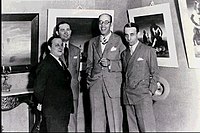
Mário Raul de Morais Andrade (Portuguese pronunciation: [ˈmaɾiu ʁaˈu dʒi moˈɾajs ɐ̃ˈdɾadʒi]; October 9, 1893 – February 25, 1945) was a Brazilian poet, novelist, musicologist, art historian and critic, and photographer. He wrote one of the first and most influential collections of modern Brazilian poetry, Paulicéia Desvairada (Hallucinated City), published in 1922. He has had considerable influence on modern Brazilian literature, and as a scholar and essayist—he was a pioneer of the field of ethnomusicology—his influence has reached far beyond Brazil.
Andrade was a central figure in the avant-garde movement of São Paulo for twenty years. Trained as a musician and best known as a poet and novelist, Andrade was personally involved in virtually every discipline that was connected with São Paulo modernism. His photography and essays on a wide variety of subjects, from history to literature and music, were widely published. He was the driving force behind the Modern Art Week, the 1922 event that reshaped both literature and the visual arts in Brazil, and a member of the avant-garde "Group of Five". The ideas behind the Week were further explored in the preface to his poetry collection Pauliceia Desvairada, and in the poems themselves. (Full article...)
Selected biography 5
Portal:Books/Selected biography/5

Isabella Augusta, Lady Gregory (née Persse; 15 March 1852 – 22 May 1932) was an Anglo-Irish dramatist, folklorist and theatre manager. With William Butler Yeats and Edward Martyn, she co-founded the Irish Literary Theatre and the Abbey Theatre, and wrote numerous short works for both companies. Lady Gregory produced a number of books of retellings of stories taken from Irish mythology. Born into a class that identified closely with British rule, she turned against it. Her conversion to cultural nationalism, as evidenced by her writings, was emblematic of many of the political struggles that occurred in Ireland during her lifetime.
Lady Gregory is mainly remembered for her work behind the Irish Literary Revival. Her home at Coole Park in County Galway served as an important meeting place for leading Revival figures, and her early work as a member of the board of the Abbey was at least as important as her creative writings for that theatre's development. Lady Gregory's motto was taken from Aristotle: "To think like a wise man, but to express oneself like the common people." (Full article...)
Selected biography 6
Portal:Books/Selected biography/6

Anna Laetitia Barbauld (/bɑːrˈboʊld/, by herself possibly /bɑːrˈboʊ/, as in French, née Aikin; 20 June 1743 – 9 March 1825) was a prominent English poet, essayist, literary critic, editor, and author of children's literature. A prominent member of the Blue Stockings Society and a "woman of letters" who published in multiple genres, Barbauld had a successful writing career that spanned more than half a century.
She was a noted teacher at the Palgrave Academy and an innovative writer of works for children. Her primers provided a model for more than a century. Her essays showed it was possible for a woman to be engaged in the public sphere; other women authors such as Elizabeth Benger emulated her. Barbauld's literary career spanned numerous periods in British literary history: her work promoted the values of the enlightenment and of sensibility, while her poetry made a founding contribution to the development of British Romanticism. Barbauld was also a literary critic. Her anthology of 18th-century novels helped to establish the canon as it is known today. (Full article...)
Selected biography 7
Portal:Books/Selected biography/7

Rachel Louise Carson (May 27, 1907 – April 14, 1964) was an American marine biologist, writer, and conservationist whose sea trilogy (1941–1955) and book Silent Spring (1962) are credited with advancing marine conservation and the global environmental movement.
Carson began her career as an aquatic biologist in the U.S. Bureau of Fisheries, and became a full-time nature writer in the 1950s. Her widely praised 1951 bestseller The Sea Around Us won her a U.S. National Book Award, recognition as a gifted writer and financial security. Its success prompted the republication of her first book, Under the Sea Wind (1941), in 1952, which was followed by The Edge of the Sea in 1955 — both were also bestsellers. This sea trilogy explores the whole of ocean life from the shores to the depths. (Full article...)
Selected biography 8
Portal:Books/Selected biography/8
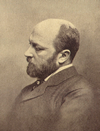
Henry James OM (15 April 1843 – 28 February 1916) was an American-British author. He is regarded as a key transitional figure between literary realism and literary modernism, and is considered by many to be among the greatest novelists in the English language. He was the son of Henry James Sr. and the brother of philosopher and psychologist William James and diarist Alice James.
He is best known for his novels dealing with the social and marital interplay between émigré Americans, the English, and continental Europeans, such as The Portrait of a Lady. His later works, such as The Ambassadors, The Wings of the Dove and The Golden Bowl were increasingly experimental. In describing the internal states of mind and social dynamics of his characters, James often wrote in a style in which ambiguous or contradictory motives and impressions were overlaid or juxtaposed in the discussion of a character's psyche. For their unique ambiguity, as well as for other aspects of their composition, his late works have been compared to Impressionist painting. (Full article...)
Selected biography 9
Portal:Books/Selected biography/9

Joseph Johnson (15 November 1738 – 20 December 1809) was an influential 18th-century London bookseller and publisher. His publications covered a wide variety of genres and a broad spectrum of opinions on important issues. Johnson is best known for publishing the works of radical thinkers such as Mary Wollstonecraft, William Godwin, Thomas Malthus, Erasmus Darwin and Joel Barlow, feminist economist Priscilla Wakefield, as well as religious Dissenters such as Joseph Priestley, Anna Laetitia Barbauld, Gilbert Wakefield, and George Walker.
In the 1760s, Johnson established his publishing business, which focused primarily on religious works. He also became friends with Priestley and the artist Henry Fuseli – two relationships that lasted his entire life and brought him much business. In the 1770s and 1780s, Johnson expanded his business, publishing important works in medicine and children's literature as well as the popular poetry of William Cowper and Erasmus Darwin. Throughout his career, Johnson helped shape the thought of his era not only through his publications, but also through his support of innovative writers and thinkers. He fostered the open discussion of new ideas, particularly at his famous weekly dinners, the regular attendees of which became known as the "Johnson Circle". (Full article...)
Selected biography 10
Portal:Books/Selected biography/10 Thomas Ruggles Pynchon Jr. (/ˈpɪntʃɒn/ PIN-chon, commonly /ˈpɪntʃən/ PIN-chən; born May 8, 1937) is an American novelist noted for his dense and complex novels. His fiction and non-fiction writings encompass a vast array of subject matter, genres and themes, including history, music, science, and mathematics. For Gravity's Rainbow, Pynchon won the 1973 U.S. National Book Award for Fiction. He is widely regarded as one of the greatest American novelists.
Hailing from Long Island, Pynchon served two years in the United States Navy and earned an English degree from Cornell University. After publishing several short stories in the late 1950s and early 1960s, he began composing the novels for which he is best known: V. (1963), The Crying of Lot 49 (1966), and Gravity's Rainbow (1973). Rumors of a historical novel about Charles Mason and Jeremiah Dixon had circulated as early as the 1980s; the novel, Mason & Dixon, was published in 1997 to critical acclaim. His 2009 novel Inherent Vice was adapted into a feature film by Paul Thomas Anderson in 2014. Pynchon is notoriously reclusive from the media; few photographs of him have been published, and rumors about his location and identity have circulated since the 1960s. Pynchon's most recent novel, Bleeding Edge, was published in 2013. (Full article...)
Selected biography 11
Portal:Books/Selected biography/11

Mary Wollstonecraft (/ˈwʊlstənkræft/, also UK: /-krɑːft/; 27 April 1759 – 10 September 1797) was a British writer, philosopher, and advocate of women's rights. Until the late 20th century, Wollstonecraft's life, which encompassed several unconventional (at the time) personal relationships, received more attention than her writing. Wollstonecraft is regarded as one of the founding feminist philosophers, and feminists often cite both her life and her works as important influences.
During her brief career she wrote novels, treatises, a travel narrative, a history of the French Revolution, a conduct book, and a children's book. Wollstonecraft is best known for A Vindication of the Rights of Woman (1792), in which she argues that women are not naturally inferior to men but appear to be only because they lack education. She suggests that both men and women should be treated as rational beings and imagines a social order founded on reason. (Full article...)
Selected biography 12
Portal:Books/Selected biography/12
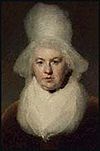
Sarah Trimmer (née Kirby; 6 January 1741 – 15 December 1810) was an English writer and critic of 18th-century British children's literature, as well as an educational reformer. Her periodical, The Guardian of Education, helped to define the emerging genre by seriously reviewing children's literature for the first time; it also provided the first history of children's literature, establishing a canon of the early landmarks of the genre that scholars still use today. Trimmer's most popular children's book, Fabulous Histories, inspired numerous children's animal stories and remained in print for over a century.
Trimmer was also an active philanthropist. She founded several Sunday schools and charity schools in her parish. To further these educational projects, she wrote textbooks and manuals for women interested in starting their own schools. Trimmer's efforts inspired other women, such as Hannah More, to establish Sunday school programs and to write for children and the poor. (Full article...)
Selected biography 13
Portal:Books/Selected biography/13
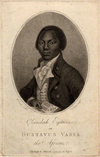
Olaudah Equiano (/əˈlaʊdə/; c. 1745 – 31 March 1797), known for most of his life as Gustavus Vassa (/ˈvæsə/), was a writer and abolitionist. According to his memoir, he was from the village of Essaka in modern southern Nigeria. Enslaved as a child in West Africa, he was shipped to the Caribbean and sold to a Royal Navy officer. He was sold twice more before purchasing his freedom in 1766.
As a freedman in London, Equiano supported the British abolitionist movement, in the 1780s becoming one of its leading figures. Equiano was part of the abolitionist group the Sons of Africa, whose members were Africans living in Britain. His 1789 autobiography, The Interesting Narrative of the Life of Olaudah Equiano, sold so well that nine editions were published during his life and helped secure passage of the British Slave Trade Act 1807, which abolished the slave trade. The Interesting Narrative gained renewed popularity among scholars in the late 20th century and remains a useful primary source. (Full article...)
Selected biography 14
Portal:Books/Selected biography/14

Dame Agatha Mary Clarissa Christie, Lady Mallowan, (née Miller; 15 September 1890 – 12 January 1976) was a British author known for her 66 detective novels and 14 short story collections, particularly those revolving around fictional detectives Hercule Poirot and Miss Marple. She also wrote the world's longest-running play, the murder mystery The Mousetrap, which has been performed in the West End of London since 1952. A writer during the "Golden Age of Detective Fiction", Christie has been called the "Queen of Crime"—a moniker which is now trademarked by her estate—or the "Queen of Mystery". She also wrote six novels under the pseudonym Mary Westmacott. In 1971, she was made a Dame (DBE) by Queen Elizabeth II for her contributions to literature. Guinness World Records lists Christie as the best-selling fiction writer of all time, her novels having sold more than two billion copies.
Christie was born into a wealthy upper-middle-class family in Torquay, Devon, and was largely home-schooled. She was initially an unsuccessful writer with six consecutive rejections, but this changed in 1920 when The Mysterious Affair at Styles, featuring detective Hercule Poirot, was published. Her first husband was Archibald Christie; they married in 1914 and had one child before divorcing in 1928. Following the breakdown of her marriage and the death of her mother in 1926, she made international headlines by going missing for eleven days. During both World Wars, she served in hospital dispensaries, acquiring a thorough knowledge of the poisons that featured in many of her novels, short stories, and plays. Following her marriage to archaeologist Max Mallowan in 1930, she spent several months each year on digs in the Middle East and used her first-hand knowledge of this profession in her fiction. (Full article...)
Selected biography 15
Portal:Books/Selected biography/15
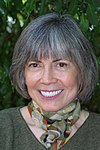
Anne Rice (born Howard Allen Frances O'Brien; October 4, 1941 – December 11, 2021) was an American author of gothic fiction, erotic literature, and Bible fiction. She is best known for writing The Vampire Chronicles. She later adapted the first volume in the series into a commercially successful eponymous film, Interview with the Vampire (1994).
Born in New Orleans, Rice spent much of her early life in the city before moving to Texas, and later to San Francisco. She was raised in an observant Catholic family but became an agnostic as a young adult. She began her professional writing career with the publication of Interview with the Vampire (1976), while living in California, and began writing sequels to the novel in the 1980s. In the mid-2000s, following a publicized return to Catholicism, she published the novels Christ the Lord: Out of Egypt and Christ the Lord: The Road to Cana, fictionalized accounts of certain incidents in the life of Jesus. Several years later she distanced from organized Christianity, while remaining devoted to Jesus. She later considered herself a secular humanist. (Full article...)
